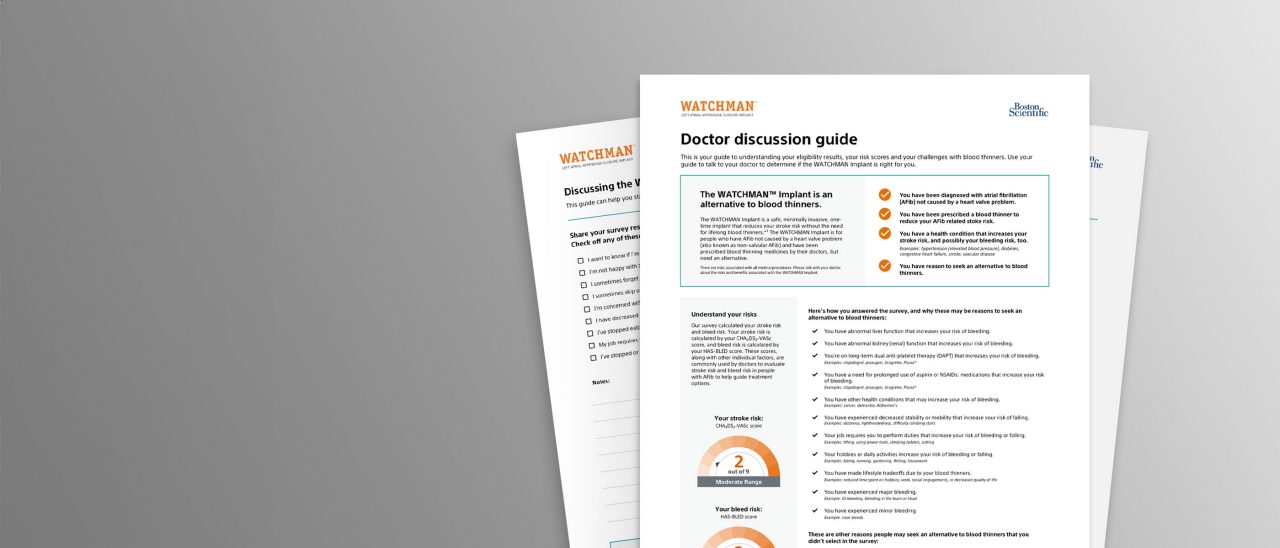The WATCHMAN Implant difference
The WATCHMAN Implant is a one-time, minimally invasive implant to reduce stroke risk for people with non-valvular AFib (NV-AFib), or AFib not caused by a heart valve problem. The WATCHMAN Implant device doesn’t have the same bleeding risks associated with the long-term use of blood thinners.2 Patients can get back to life as usual with the WATCHMAN Implant, since there are virtually no long-term restrictions after the procedure.
There are risks associated with all medical procedures. Please talk with your doctor about the risks and benefits of the WATCHMAN Implant.
96%
Freedom from blood thinners
96% of people stopped blood thinners 45 days after their procedure*1
99%
A safe procedure
High implant success rate of 99%** and a low major complication rate of 0.5%†1
500.000
Proven safety record
Over 20 years of clinical and real-world experience, over 10 clinical studies and over 500,000 people treated
The WATCHMAN Implant is the #1 doctor recommended, most implanted device for left atrial appendage closure.

Benefits of the WATCHMAN Implant vs. long-term blood thinners
Safe, minimally-invasive, one-time, permanent implant
Reduces stroke risk without lifelong blood thinner medications
Freedom from lifestyle limitations due to blood thinner challenges and the worry that comes along with them

Who Is WATCHMAN FLX Not For?
People who should not receive the WATCHMAN FLX Implant include but are notlimited to those who:
- Should not or cannot undergo heart catheterization procedures
- Have a left atrial appendage that is too large or too small to fit the WATCHMAN FLXImplant
- Ask your cardiologist if any of these conditions apply to you.

Who WATCHMAN FLX Is For
The WATCHMAN FLX Implant may be right for people who meet the following criteria:
- They have atrial fibrillation not caused by a heart valve problem (also known as non-valvular AF)
- They are at high risk of bleeding or they have experienced bleeding
- They have contraindication or intolerance to oral anticoagulants
As with any medical procedure, there are risks involved with WATCHMAN FLX. See the Important Safety Information below for a list of possible complications, and ask your cardiologist about the risks and benefits of WATCHMAN FLX.
Is the WATCHMAN Implant safe?
Dr. Abisogun, a specialist who performs the WATCHMAN Implant procedure, explains what makes it safe.
Why Daniel chose the WATCHMAN Implant
Daniel's bleeding risks on blood thinners were keeping him from doing the things he loved.
Talk with your doctor
If you have atrial fibrillation not caused by a heart valve problem and you’re looking for an alternative to blood thinners, then it’s important to talk to your doctor about your options.
Recommended questions you can ask:
What are the benefits and risks of the different blood thinners?
What are the benefits and risks of the WATCHMAN Implant?
Does my lifestyle or health history put me at risk for serious bleeding?
Am I a candidate for the WATCHMAN Implant?
What should I know about the WATCHMAN Implant?
What are the differences in cost between blood thinners and the WATCHMAN Implant?
Tell your doctor about any falls or accidents, unusual bruising, or symptoms of bleeding that you’ve had while on blood thinners. And be sure to ask about the benefits and risks associated with the WATCHMAN Implant.

*In a clinical trial, 96% of patients were able to discontinue their blood thinner 45 days after getting the WATCHMAN Implant.
**Procedure success defined as successful delivery and release of a WATCHMAN FLX device into the LAA.
† In a post-FDA approval analysis. Major complication is defined as an occurrence of one of the following events between the time of implant and within 7 days following the procedure or by hospital discharge, whichever is later: all-cause death, ischemic stroke, systemic embolism, or device or procedure related events requiring open cardiac surgery or major endovascular intervention.
References:
1. Kar, S., et al, Primary Outcome Evaluation of the Next Generation LAAC Device: Results from the PINNACLE FLX Trial, Circulation, 2021.
2. Price MJ, Reddy VY, Valderrábano M, et al. Bleeding outcomes after left atrial appendage closure compared with long-term warfarin. JACC Cardiovasc Interv. 2015;8(15):1925-1932.
This material is for informational purposes only and not meant for medical diagnosis. This information does not constitute medical or legal advice, and Boston Scientific makes no representation regarding the medical benefits included in this information. Boston Scientific strongly recommends that you consult with your physician on all matters pertaining to your health.


